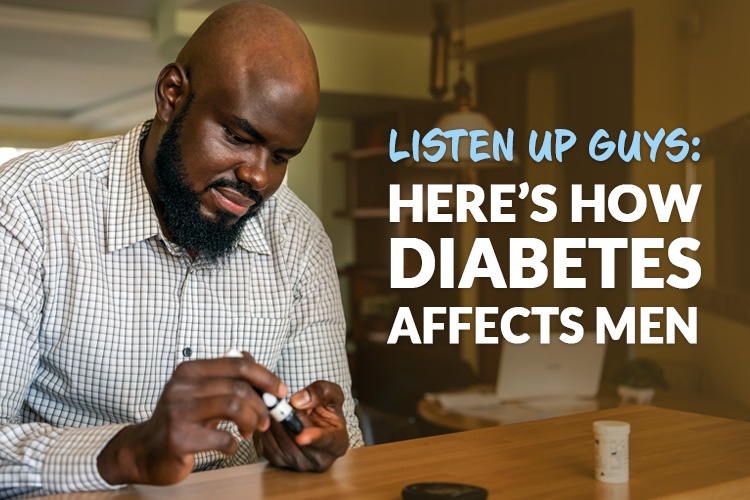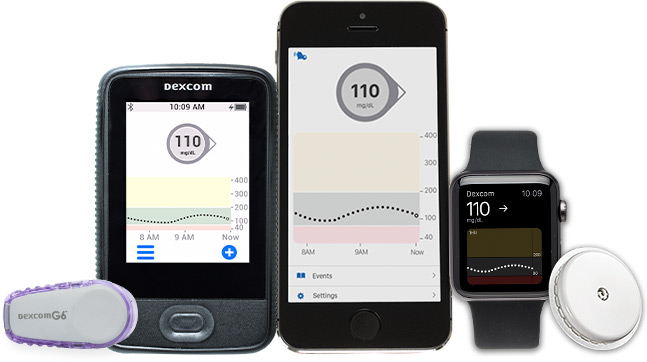Listen Up Guys: Here’s How Diabetes Affects Men
This post was reviewed by our Director of Clinical Excellence and Oversight.
You’ve probably heard the saying, “Men are from Mars and Women are from Venus.” This phrase was coined to show that in many ways, men and women speak, act, and view the world differently. Did you know that those differences also extend to how the sexes experience health conditions, including type 2 diabetes? If you are a man with diabetes, or care about one, you’ll want to read this eye-opening post.

Let’s start with the numbers. Overall, more men than women experience high blood sugar. According to the Centers for Disease Control (CDC), about 15.5 percent of men developed diabetes in 2020, compared with 13.2 percent of women. Type 2 diabetes, which is associated with weight gain and lifestyle factors, tends to hit men especially hard. Men between the ages of 35-54 are more likely to receive a diagnosis of type 2 diabetes at a lower weight than women. Research has shown that one reason for this is that men tend to store excess fat in their stomachs. Abdominal fat is a risk factor for type 2 diabetes as fat cells are more resistant to insulin.

Overall, more men than women experience high blood sugar—about 15.5 percent of guys developed diabetes in 2020, compared with 13.2 percent of women.
What’s the Same? What’s Different?
Diabetes is a complicated condition that causes symptoms in both men and women such as constant thirst, frequently needing to pee, fatigue, dizziness, and weight loss. Diabetes can also contribute to many other health complications for those of both genders, including vision problems, kidney disease, neuropathy and other foot issues, heart disease, and stroke.
Beyond these concerns, diabetes targets men with a number of urologic and sexual health problems unique to them. Early prevention, diagnosis, and treatment is essential to reducing complications related to diabetes especially for men. It’s particularly important for those men who tend to avoid addressing their health and may go years without seeing a doctor.
Time for a Conversation
One of the factors at play is the (mostly) male hormone testosterone. Research has shown that low levels of testosterone in men appear to be a risk factor for type 2 diabetes. That’s a serious concern, as low testosterone is increasingly common.
One of the unfortunate effects of diabetes for some men is erectile dysfunction or ED. Common in the middle years and beyond, ED is the inability “to get or keep an erection firm enough for sex,” according to the CDC. Erectile Dysfunction is common in men with uncontrolled diabetes due to a condition called autonomic neuropathy. In fact, men with diabetes are three times more likely to have ED. In addition, some medications prescribed for diabetes can contribute to ED.

Treatment for erectile dysfunction can include medication or testosterone, but both of these can be tricky for guys with diabetes. That’s why an open and honest conversation with your doctor is so essential. Other treatment options to be discussed include a vacuum device, injection/suppository before sex, or an implant.
Research has shown that low levels of testosterone in men appear to be a risk factor for type 2 diabetes.
Bladder Matters
Beyond the sexual complications, some men with diabetes experience urologic problems such as overactive bladder and urinary tract infections. High glucose levels can affect the autonomic nerves that control the bladder leading to bladder control problems such as urinating very often or not enough, feeling the need to urinate when you do not have to, the inability to feel the need to urinate even when bladder is full, and frequent bladder infections.
Another concern for guys living with diabetes is urine retention and infrequent urination, which can contribute to kidney disease. Also, diabetes can increase the risk of cancer of the prostate and kidney.
Is There Any Good News Here?
Yes, as a matter of fact there is! Many men with diabetes successfully avoid sexual and urologic complications. Their secret is really no secret at all. It’s just a matter of following the steps your healthcare team recommends to keep your blood sugar in range. You’re probably familiar with them, but in case you need a refresher, read on!
Eat Right. Foods with carbohydrates may elevate blood glucose levels. To stabilize blood glucose levels it is important to eat a colorful diet with protein, vegetables, fruits, and carbohydrates. And yes, you can enjoy a steak and even dessert from time to time.
Mind the Meds. Whether you take insulin or other medications that improve your body’s ability to process insulin, be sure to take your meds consistently, at the dose and time your doctor prescribes.
Exercise Regularly. Physical activity helps control blood sugar. It also burns calories and contributes to a sense of wellbeing. The key to success is an exercise program that you’ll enjoy and stick to. Pickleball? Hiking? Shooting hoops in the back yard? Pick your favorite(s) and get moving.

Know Your Numbers. Managing diabetes is a matter of balancing all of the above—food, medication, and exercise—to achieve your doctor-recommended blood sugar range. Regularly monitoring your glucose level lets you know what needs tweaking to stay on track.
Partner with Your Doc
According to one study, 70 percent of guys said they’d rather do chores around the house than see the doctor. Yikes! Partnering with a trusted healthcare professional is just common sense. Seeing your doc will help you stay on top of the conditions you have and, with your medical team’s guidance, take steps to avoid other health problems down the road. There you have it—clear and straightforward, just like guys like it!
We Can Help
Whether you were a Boy Scout or not, you know that being prepared is the key to succeeding in many aspects of life. And that certainly applies to living with diabetes. That’s why so many people with high blood sugar rely on Home Care Delivered to keep them supplied with test strips, monitors, lancets, syringes, and other supplies to manage their diabetes. Follow their lead, eliminate the stress, and enjoy convenient, at-home delivery of your insurance-, Medicaid-, and Medicare-covered products.

HCD is honored to be part of your health and wellness team! Call today to enroll at 804-885-4101. Or, provide your phone number on the bottom left of the screen and a team member will be glad to give you a call.
Guys, we’ve got your back as you do all you can to avoid unwanted complications of diabetes!
Get Insurance-Covered CGM & Diabetes Supplies
Monthly Deliveries | We Handle the Paperwork

Disclaimer:
Unless otherwise noted, the recommendations in this document were obtained from the sources indicated. Be advised that information contained herein is intended to serve as a useful reference for informational purposes only. HCD cannot be held responsible for the continued accuracy of or for any errors or omissions in the information. All trademarks and registered trademarks are the property of their respective owners.
